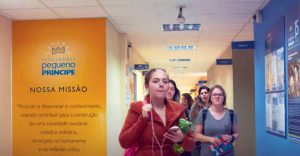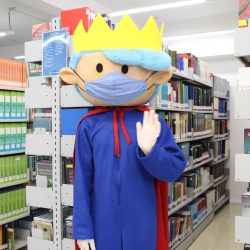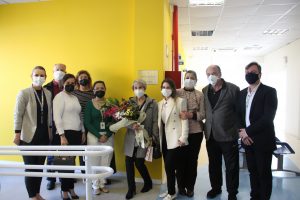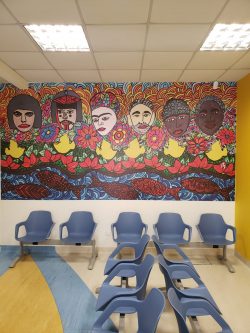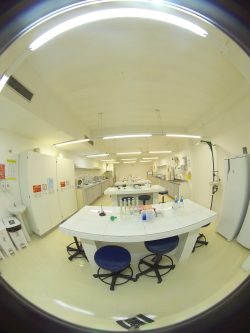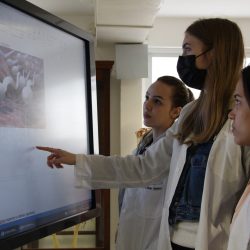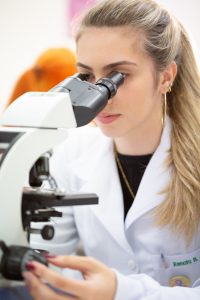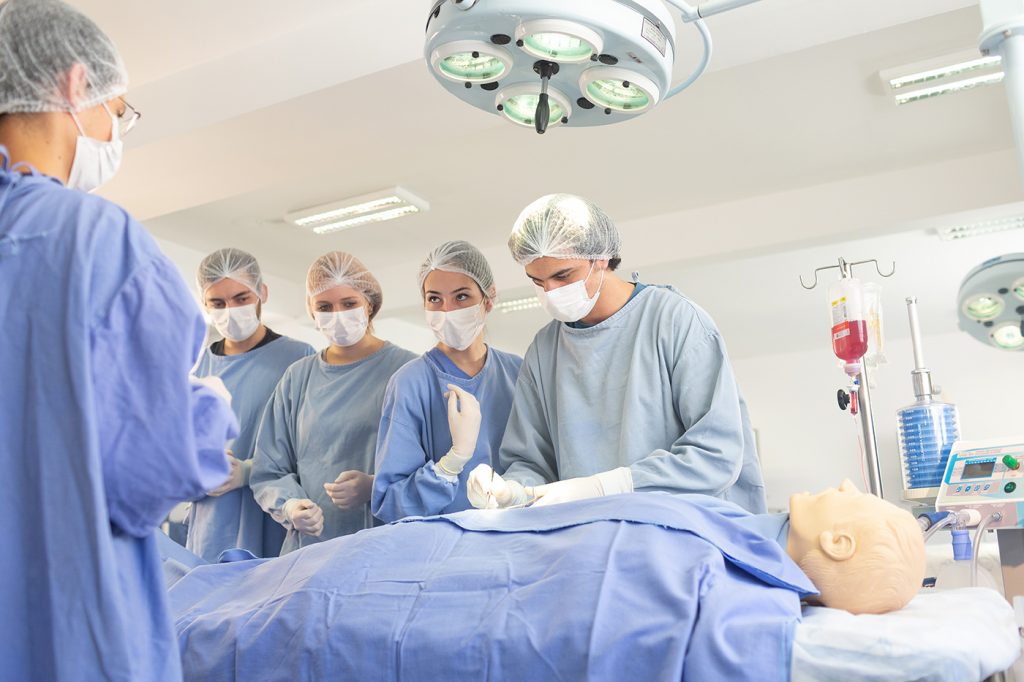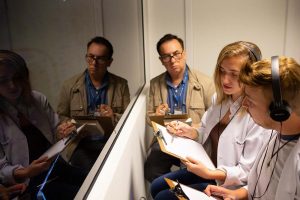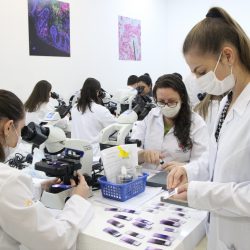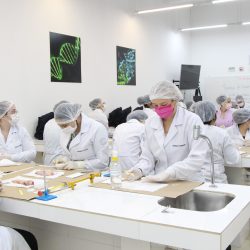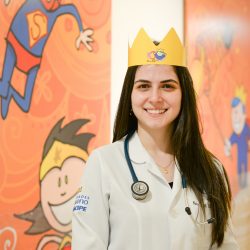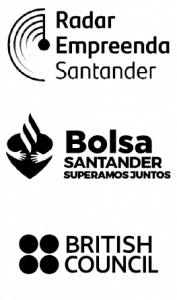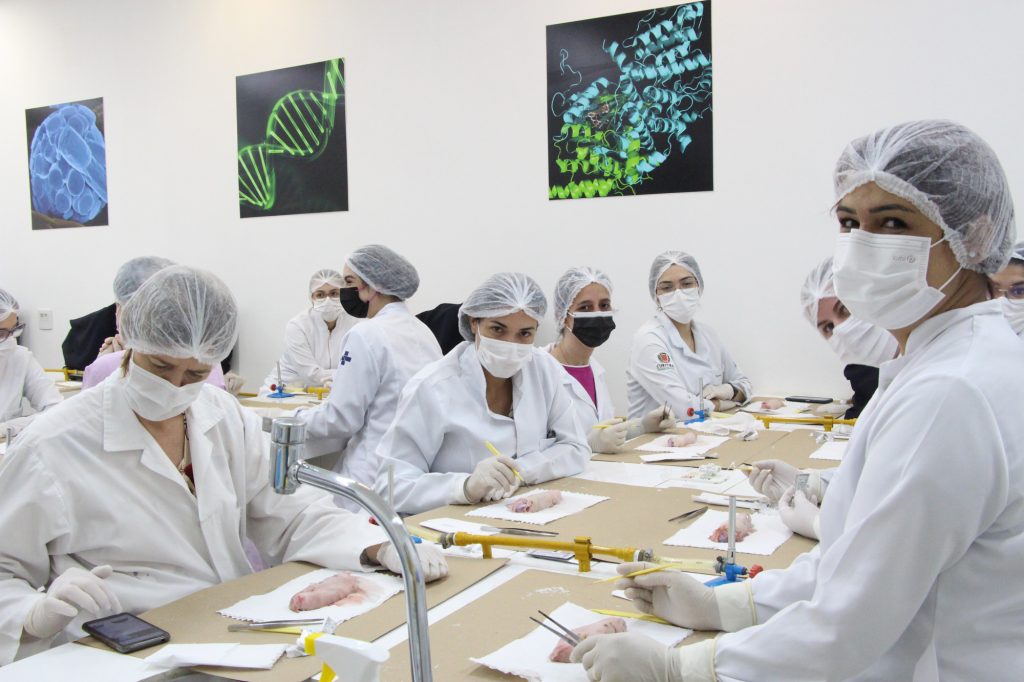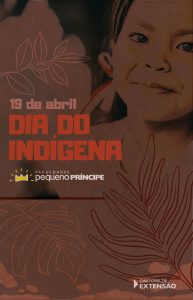
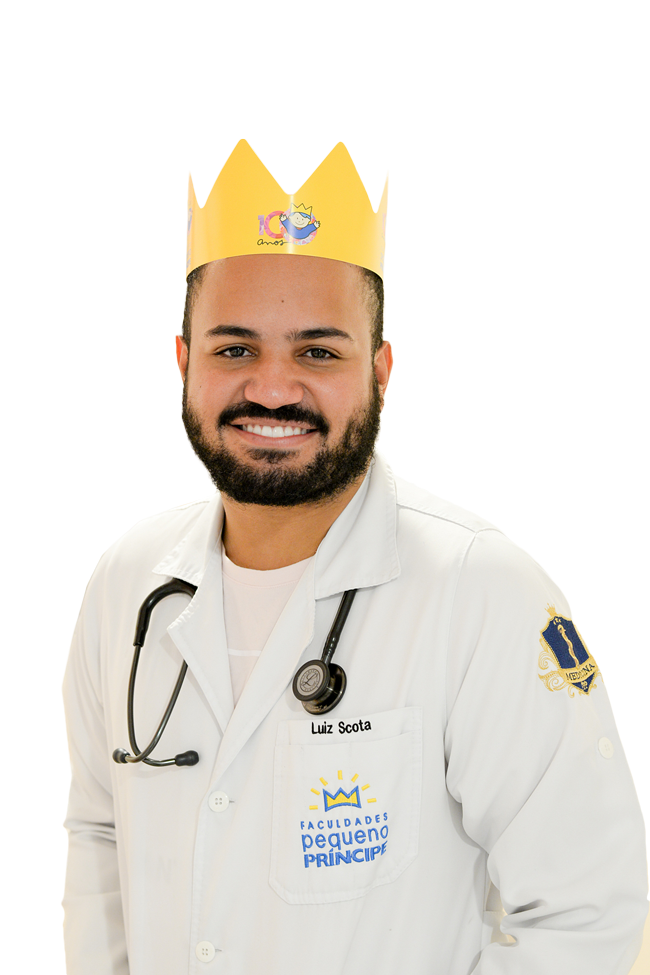
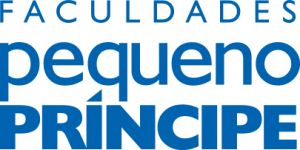
“Education and science are vaccines against the pandemic.”
UNESCO, in a document on COVID-19 and higher education
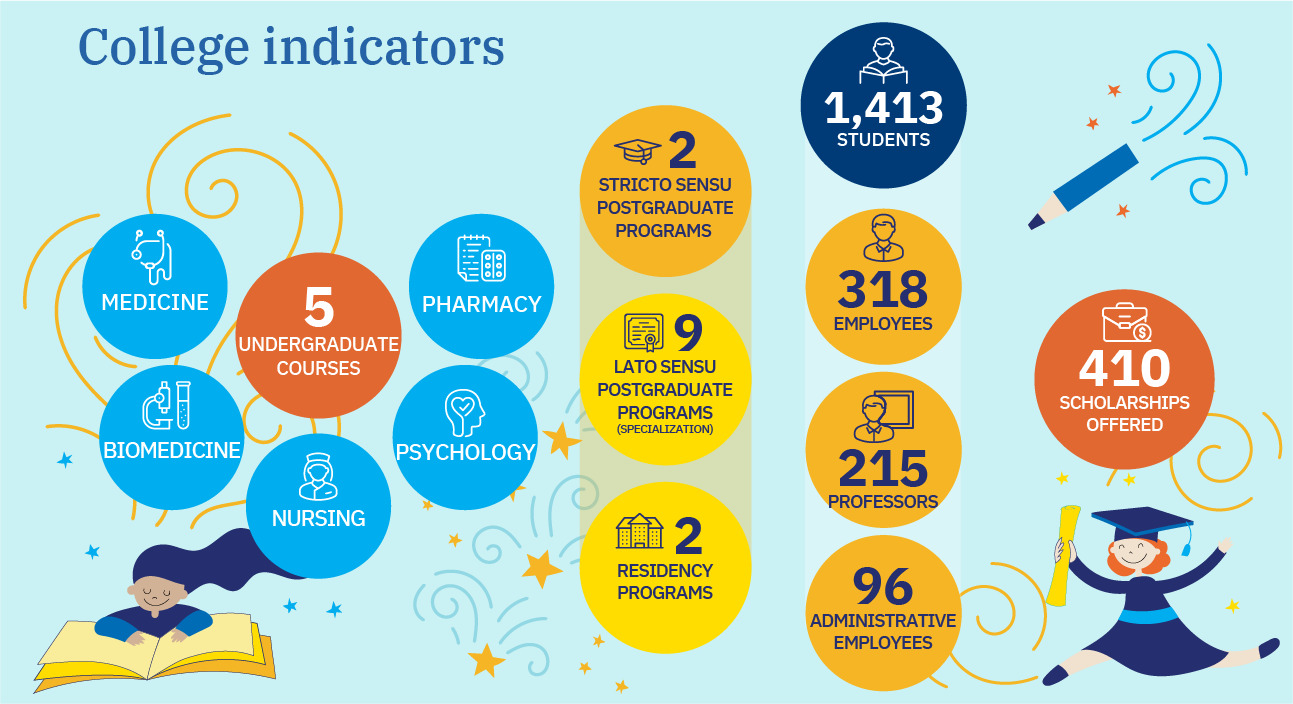

Teaching and the changing world
The outbreak of the COVID-19 pandemic has forced the world to change at a speed never seen before – and of all industries, few have changed as quickly as education. After adapting to remote teaching in the first year of the crisis, migrating its main activities to the online environment, Pequeno Príncipe College made 2021 the year of reinventing face-to-face teaching.
During the first semester, with due care and compliance with prevention rules, the modality was widely resumed at all levels: undergraduate, lato sensu graduate, stricto sensu graduate, extension and residency programs.
The return to classrooms and interaction between students, teachers and employees gained even more momentum thanks to vaccination. The arrival of the immunizers was received by employees and the faculty with enthusiasm. The College also encouraged the vaccination of students with actions on social networks – and had an excellent return, with 100% of the students immunized in the period of gradual resumption of face-to-face teaching.
But learning from the most acute phase of the pandemic has not been forgotten. The institution definitely incorporated strategies developed for distance education. It continued, for example, to provide theoretical classes on the internet and to hold academic meetings on video call platforms. Together, the face-to-face and the virtual features resulted in more agility and flexibility in educational activities and management processes.
By embracing the new teaching tools, the College renews the centenary commitment of the Pequeno Príncipe Complex to education, reaffirming its mission to train health professionals prepared for the future and aware of the need to build a healthier, more supportive and community-engaged society.
Pequeno Príncipe College in 2021
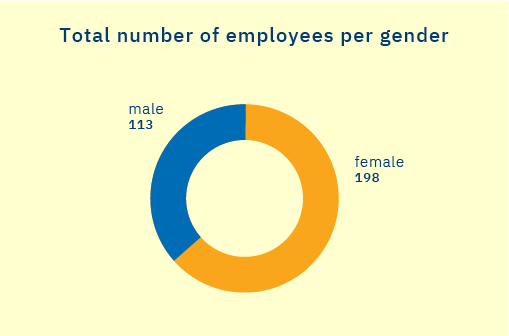
By embracing the new teaching tools, the College renews the centenary commitment of the Pequeno Príncipe Complex to education.
Institutional dimension
Due to the need to maintain restrictive measures, Pequeno Príncipe College reinforced its attention to the health of its employees. And, despite the adverse scenario, it made a series of improvements: in the working conditions of the teams, in their facilities and in the implementation of programs.
- COVID-19 care
The institution distributed prevention items (such as masks and gel alcohol) and closely monitored the vaccination of employees against COVID-19, offering all the necessary support. It instituted the rotation of the home office when face-to-face activities were resumed, thus avoiding agglomerations and creating a safe place. Working conditions in the home environment were a constant concern: with the availability of ergonomic chairs and equipment to all who requested them.
- Assistance to employees
The facilities of the Human Resources Sector were expanded in order to improve the quality of service provided to professors and members of the technical-administrative staff. The Occupational Medicine area gained an adapted space for conducting medical examinations (admissions, dismissals and periodicals). The Employees’ Rest Room also underwent expansion, ensuring more comfort in moments of rest.
- More space for teaching
One of the most anticipated projects of recent years has finally come to fruition: Block 6 of the College opened in September. The building now houses part of the administrative area, 12 tutoring rooms, the Marketing Sector, the Educational Technologies Center (NTE), a complete studio for recording video lessons and the Pequeno Príncipe College’s Multiprofessional Outpatient Clinic, designed to develop professional and collaboration skills of students from all courses of the institution.
- Professional development and training
The College expanded the Training Program for the Technical-Administrative Staff and Faculty, with an allowance of up to 100% in development and improvement courses.
- Communication with society
Different actions strengthened the College’s relationship with society, resulting in more visibility, greater engagement in social networks and the dissemination of health information. Examples of this are the Tour 360, an immersive tool that allows anyone to take a virtual tour of the unit’s facilities, and the special “Professions that Transform the World”, published on the G1 portal.
- Open channel with students
Responding to requests from the student community, listening to suggestions and implementing actions to correct any problems were demands that grew as the pandemic lasted. As a result, the College redoubled its attention to its Ombudsman, the main communication channel for students and society with the higher levels of the institution.
- Data protection and privacy
Created in September 2020 by an internal ordinance, in compliance with the Brazilian General Data Protection Law (LGPD, in Portuguese), the College’s General Data Protection Law Implementation Commission advanced throughout 2021 in the work of internal mapping of information. The body is creating a corporate data protection policy; defining values in respect of the right to privacy; establishing the form of treatment of the information; and suggesting mechanisms to protect personal data held by the institution and to deal with possible incidents.
Teaching dimension
After an atypical period in the first year of the pandemic, education was readapted to avoid harm to students and reached important achievements in 2021. Below, check out the three main highlights in this aspect.
- Expedition in content replacement
The professors’ commitment made it possible to quickly restore the curricular calendar, partially compromised in 2020 due to the impossibility of holding practical classes as a consequence to social distancing measures. All academic activities of this nature were resumed in February 2021, dividing the classes into small groups and following the current health rules. - Mass vaccination of students
The coordination of each course stimulated vaccination against COVID-19 among students, as soon as the first immunizations were made available to the group. The students’ response was extremely positive, and practically all of them managed to get two doses of the vaccine between the first and second semester. - Performance in national assessments
Two courses had excellent performance in national quality indicators. In the 2021 Progress Assessment, carried out by the Brazilian Association of Medical Education (Abem, abbreviation in Portuguese), medical students of all years had scores above the national averages and those of the Southern Region. The Nursing course, on the other hand, obtained the maximum mark in the renewal of recognition from the federal government, according to an ordinance of the Ministry of Education.
Undergraduate courses
See below the other highlights of Pequeno Príncipe College’s undergraduate courses.
Pharmacy
Actions aimed at the community: the outreach area once again carried out face-to-face actions in organizations such as educational institutions, nursing homes, orphanages and institutions that support women in situations of domestic violence or people with HIV. There were 23 activities in the second semester, such as an informative lecture promoted by students from the Solidarity Project at Lar Santa Inês, which welcomes the elderly in Curitiba, on how to administer medication. The project also held live streams open to the public on YouTube with experts on children and adolescents in risk situations and transgender groups, among other subjects.
Integration with residents: students from the Integration, Outreach and Community III program, taught in the third period, got to know the daily life of the Multiprofessional Residency Program in Child and Adolescent Health. The integration project exposed the scenarios that residents find inside and outside the Pequeno Príncipe Hospital, and their work with the Stewardship Program, the Immunology Service, the Hospital Pharmacy Sector and the Neonatal ICU, among others. The activity resulted in a documentary produced by the students and presented to residents, other professionals from Pequeno Príncipe and the community during a virtual seminar.
Medicine
Reintegration of the internship: mandatory curricular internship in the last two years of the graduation of new medical doctors, the internship of the Medicine course resumed to work normally with the return of face-to-face activities. Thus, the students maintained constant contact with the professional reality and with an important door to the job market.
Skills assessment: for the first time, the 200 boarding students took the virtual OSCE (English acronym for Objective Structured Clinical Examination). This is a practical test considered the standard of excellence in the assessment of skills and competences in the simulation of procedures.
Psychology
Multiplicity in extension program: curricular extension activities included live streams, booklets, lectures, workshops and audiovisual projects. Among the actions that had the most repercussions are the documentary “Impacts of the Sequelae of COVID-19 on Traffic” and the II Solidarity Fair, a partnership with Libersol (Mental Health and Solidarity Economy Network) that brought the academic community closer to entrepreneurs linked to mental healthcare services.
New study group: research and the appreciation of ethical principles of future professionals in the mental health area gained an academic forum with the creation of Genesis (Group of Guiding Studies on Ethics in Health, Intersubjectivity and Society), in partnership with the Federal University of Technology of Paraná.
Biomedicine
Teaching and technology: the Research and Technological Innovations program entered the curriculum. In it, students get in touch with concepts, processes and tools for the creation of innovative products, including the foundation through scientific articles, the development of innovative products and the submission of patent registrations.
Perspectives for the future: students who have just joined the course participated, in March, in an online conversation with biomedical doctor Janaína Naumann, chairman of the 6th Region of the Regional Council of Biomedicine. She addressed the good prospects for the performance of professionals in the area and the growing importance of biomedical professionals, who have made a difference in the fight against COVID-19 due to their specialization in clinical analysis.
Nursing
Vaccination in practice: thanks to a partnership with the Municipal Department of Health of Curitiba, students in the last year of the course participated in the vaccination against COVID-19 and experienced in practice the challenges of this historic immunization campaign.
Integration in public health: in recognition of the transversality of teaching in health courses – a feature of Pequeno Príncipe College –, professors and students published the chapter “Nursing and Medicine courses’ students’ integration to public health: experience report” in the book Dynamism and Clarity in Planning in Health Sciences, volume 2, released in April by Editora Atena, organized by Professor Luís Henrique Almeida Castro.
Employability Center
The Employability Center (Nemp, abbreviation in Portuguese) – which facilitates the professional placement of students and graduates of the College, with guidance and disclosure of job vacancies – played a fundamental role in 2021. This was evident especially in the first semester, when the restrictive measures of the pandemic began to be reviewed and companies felt safer to offer professional opportunities again.
The demand for interns grew especially in two periods:
- from February to June, a period that matches with the arrival of the first doses of the vaccine against COVID-19; and
- from July to August, when mass immunization began to show its positive effects and the search for interns reached the peak of the year.
The advancement of the Employability Center
| 2020 | 2021 | |
|---|---|---|
| General guidelines for undergraduates | 273 | 283 |
| Undergraduates hired as interns (Internship Commitment Terms) | 103 | 165 |
| Participants in actions promoted by Nemp | 350 | 403 |
| Internship vacancies announced by Nemp | 256 | 370 |
| Assistances | 726 | 856 |
| Tips posted on the portal | 36 | 48 |
| Articles published on the portal | 36 | 48 |
| Resumés submitted on the portal | 1,650 | 1,907 |
The 2021 achievements also include a more modern and intuitive design for the Nemp website, the publication of the Non-Mandatory Internship Manual and the launch of the Graduates Monitoring Program, in addition to the promotion of mini-courses and webinars on best practices in production of resumés and on guidelines for interviews and selection processes.
Internationalization projects and partnerships
The Internationalization Center, which since 2012 has been working with the objective of strengthening the image and promoting the insertion of the Pequeno Príncipe Complex on the world stage, in 2021 expanded the portfolio of scholarships offered to students, professors, researchers and employees of Pequeno Príncipe College.
One of the highlights was the Spanish Cooperation Grants program, a partnership with the Carolina Foundation and the Spanish Agency for International Cooperation and Development (AECID, abbreviation in Portuguese). The project made available 504 specialization grants for postgraduate, doctoral, postdoctoral stays, professor mobility (in short-term research in Spain) and institutional studies (funding of training plans in Spanish centers).
The College also renewed and expanded its agreement with Santander Bank until 2022. This initiative covers the following three aspects:
- the Santander Superamos Juntos scholarship program, which offers financial support to undergraduate students and online scholarships for language, technology, digital skills and soft skills courses;
- the Radar Empreenda Santander program, which offers scholarships in courses on design thinking (analytical and creative problem solving), business model, startups and finance; and
- three-month scholarships for a British Council English course specifically designed to learn corporate language.
The partnership with the University of Porto (Portugal) was also renewed for exchange programs, including those carried out in a virtual environment – which facilitated and encouraged the participation of the Pequeno Príncipe academic community.
Research dimension
Lato sensu – specialization
In 2021, the search for lato sensu postgraduate courses was compromised by the pandemic – due to its health and economic effects, which lasted all year (unlike 2020, when the first months were normal). There was a significant reduction in the number of enrollments in specializations compared to the previous year. Therefore, the College decided not to open new classes in the second semester.
By request of students of courses already started, online classes were maintained in most classes. Only two (Hematology 2019/2 and 2021) resumed the practical activities in person, a requirement of the course dynamics. In other cases, virtual meetings and remote classes were broadcast live from the College.
Lato sensu programs in 2021
| CLASSES STARTED | NUMBER OF ENROLLED STUDENTS |
|---|---|
| Pediatric Nursing and Neonatal Intensive Care | 29 |
| Hematology | 26 |
| Health and Hospital Psychology | 43 |
| Pediatric Anesthesiology | 5 |
| Genito-Urinary Surgery and Kidney Transplantation | 1 |
| Pediatric Echocardiography | 3 |
| Pediatric Gastroenterology | 1 |
| Pediatric Neurology | 1 |
| Pediatric Orthopedics | 6 |
| Pediatric Radiology | 2 |
| Bone Marrow Transplantation | 1 |
| CLASSES IN TRANSIT (2020 TO 2022) | NUMBER OF STUDENTS |
|---|---|
| Hematology | 12 |
| Pediatric Nursing and Neonatal Intensive Care | 19 |
| Health and Hospital Psychology | 22 |
| Clinical Pharmacy | 8 |
| CLASSES COMPLETED | NUMBER OF GRADUATES |
|---|---|
| Audit for Hospitals, Services, Systems and Health Insurance | 32 |
| Molecular Biology | 8 |
| Pediatric Nursing and Neonatal Intensive Care | 36 |
| Clinical Pharmacy | 40 |
| Health and Hospital Psychology | 32 |
| Urgency and Emergency | 15 |
| Pediatric Anesthesiology | 5 |
| Genito-Urinary Surgery and Kidney Transplantation | 1 |
| Pediatric Echocardiography | 4 |
| Pediatric Neurology | 1 |
| Pediatric Orthopedics | 5 |
| Pediatric Otorhinolaryngology | 1 |
| Pediatric Pulmonology | 1 |
| Pediatric Radiology | 2 |
| Bone Marrow Transplantation | 1 |
Stricto sensu and scientific initiation
Professors and students of postgraduate programs (master’s and doctorate) in Teaching in Health Sciences and in Biotechnology Applied to Child and Adolescent Health published 127 articles in academic journals. The production includes works in conjunction with the Pelé Pequeno Príncipe Research Institute, which concentrates the scientific studies carried out by researchers at the Complex. In times of the COVID-19 pandemic, part of the articles prioritized the study of SARS-CoV-2 (from infection to disease sequelae), but other topics were also analyzed.
Scientific initiation: the College had 122 active students in scientific initiation in 2021.
Academic production
| TEACHING IN HEALTH SCIENCES | BIOTECHNOLOGY | |
|---|---|---|
| Articles with a high impact factor | 57 | 70 |
| Book chapters | 11 | – |
Residency programs
Training, developing and improving health professionals is also a way of contributing to the practice of an increasingly qualified medicine in Brazil. Residents of the programs offered by the College continued to play an important role in the fight against COVID-19 at Pequeno Príncipe Hospital. The teams worked on different fronts – from exams to diagnose cases of the disease to care for infected patients and psychological monitoring of the Hospital’s employees.
Frontline work was combined with remote theoretical classes, which began to be evaluated by residents through an electronic form created especially for this purpose.
In the Multiprofessional Residency Program in Child and Adolescent Health (Biomedicine, Pharmacy and Psychology), nine vacancies were opened in 2021, three per course. The Uniprofessional Residency Program in Child and Adolescent Health (Nursing) opened 22 vacancies – and, at the end of the year, also trained 22 people. There were also seven trainees in the Multiprofessional Residency Program (two in Biomedicine, two in Pharmacy and three in Psychology).
Academic production of residency programs
| uniPROFESSIONAL RESIDENCY PROGRAM |
|---|
| Nursing: 3 publications |
| Multiprofessional Residency program |
| Biomedicine: 1 publication |
| Pharmacy: 3 papers presented at scientific events and 1 publication |
| Psychology: 1 paper presented at a scientific event and 1 publication |
Residents of the programs offered by the College continued to play an important role in the fight against COVID-19 at Pequeno Príncipe Hospital.
Extension dimension
The pandemic continued to be a complicating factor in extension activities, as it made face-to-face meetings difficult. Even so, it was possible to organize important actions – in the first semester, exclusively remotely; in the second, with some face-to-face activities.
| PARTICIPATION IN EXTENSION PROJECTS |
|
|---|---|
| Students | 235 |
| Teachers | 10 |
| People from the community impacted | 149,066 |
Main certified programs
- Warning Signs of Rare Diseases and Syndromes: conceived by the Paraná Group of Rare Diseases and Syndromes, sponsored by pharmaceutical company Roche and carried out by the College with support from Pequeno Príncipe Hospital, Instituto Atlas Biosocial and Instituto de Estudos em Saúde Coletiva (Inesco). In all, 450 vacancies were offered to health, education, social assistance, Judiciary and community professionals.
- The Healer’s Art – The Art of those Who Heal Fully: a joint initiative by Pequeno Príncipe College, the Federal University of Santa Catarina, the Federal University of Fronteira Sul and the Universidade Estadual Paulista, with 20 vacancies.
- Cutaneous Revitalization: course on skin cell renewal techniques, offered to 15 Biomedicine students at Pequeno Príncipe College.
- Inclusion in Higher Education: activity developed by the training program of the Teaching Development Center, aimed at integrating participants into academic life and with the participation of 22 students.
- Post-Extension modules: modality with 32 courses with varied themes, such as Clinical Pharmacy in Hematology; Infectious and Parasitic Diseases; Cardiovascular Disorders in Pediatrics and Neonatal; First Care in Neurological Urgency and Emergency; and Psychology of Mental Health. In all, 102 students participated.
- Provision of Health Services: activities in the health area offered by the College to companies from different sectors, which included 28 lectures, six orientation stands at fairs and four training courses, impacting more than 2,300 people both online as in person.
Highlight events
- Teaching, Research and Extension Meeting
The 18th edition of the Teaching, Research and Extension Meeting (Enepe) – the second consecutive one held in a virtual environment – brought together professors and undergraduate and graduate students lato and stricto sensu to debate innovations in health and discuss ways to increase inclusion and accessibility of area programs.
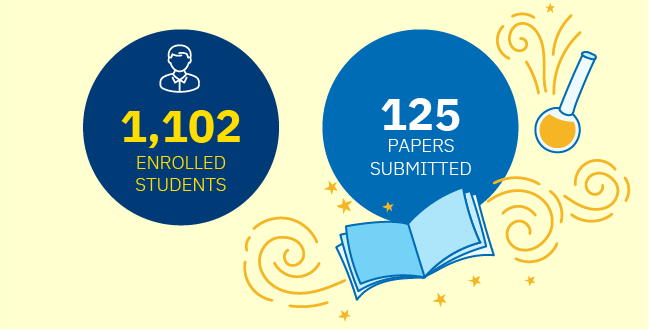
- Active Methodologies Forum and Curriculum Symposium
Jointly organized, the 10th National Forum of Active Teaching-Learning Methodologies in Health Training and the 1st Brazilian Seminar on Extension Curriculum had workshops, conferences and debates on ways of integrating teaching, service and community, in addition to works on the inclusion of extension in curriculum.
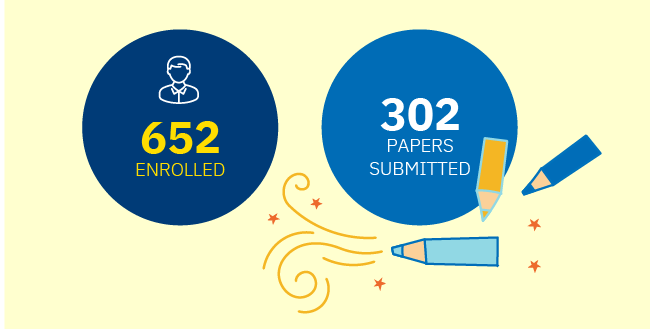
By promoting teaching and research events, the College encourage scientific production and the exchange of knowledge.
Environmental dimension
The College has implemented or expanded initiatives aimed at reducing the impact of academic activities on the environment. The projects were divided into four axes, as described below.
- Sustainable consumption of water and energy
The preventive maintenance program for the hydraulic and electrical networks carried out new actions to avoid wasting water and energy. Faucets with a timer were also installed, to reduce water consumption, and rain collection boxes, for use in cleaning bathrooms, washing carpets and watering plants. - Use of paper
Three parallel programs and projects sought to reduce the need for printing and paper consumption: the Electronic Document Management Program, which includes the Digital Secretariat; the rental of network printers, which allow sharing documents; and the implementation of protocols by the Prime System, a paper consumption management tool. - Solid waste management
Part of the Solid Health Waste Management Plan implemented in 2015 at the Pequeno Príncipe Complex, the College’s Waste Management Program involves students, professors and employees in the collection and correct disposal of waste. The institution also has an extension project that selects students every year to organize and participate in sustainability awareness actions – more than 160 students have been involved in the initiative since the program was created, which has already reached thousands of people. - Non-polluting mobility
The College’s infrastructure focused on sustainable means of transport has gained new equipment. A bicycle rack was installed to provide more convenience and safety to cyclists and encourage healthy and pollution-free transport.
Innovation dimension
Expanding the culture of innovation among students, faculty and researchers is a necessity in the 21st century and a priority for the College. For this purpose, the institution approached even more the Innovation Office launched by Pequeno Príncipe in 2020.
In 2021, the College’s management reinforced the office’s ecosystem, joining the Innovation Council, an advisory body created to facilitate the alignment of the innovation strategy in all instances of Pequeno Príncipe’s leadership. Academic representatives gained a seat in the Guardians of Innovation group, which brings together employees from all units of the Complex to monitor, suggest and discuss innovative actions and projects.
In October – National Month of Science, Technology and Innovation –, professors and students had an outstanding participation in the office’s activities. Among them, a series of live streams discussed topics such as creativity, scientific development, education in the digital world and the importance of transforming research into new technologies.


